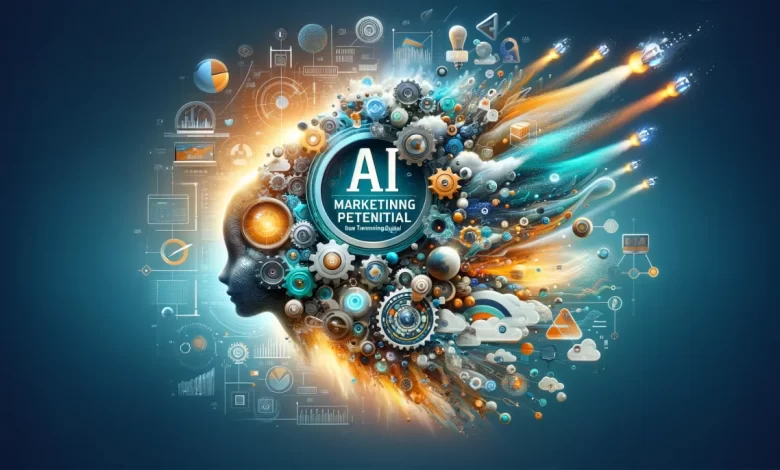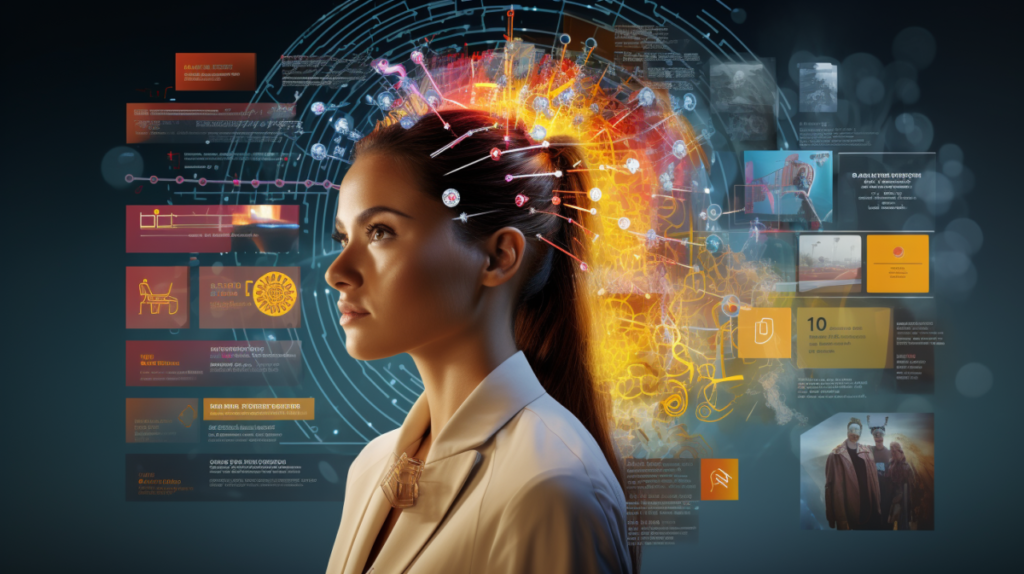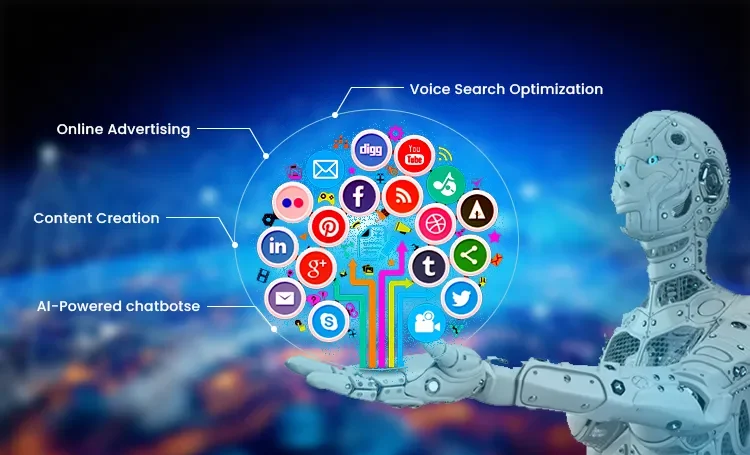AI has changed from being a sci-fi idea to a revolutionary tool for modern digital marketers.
It has developed into a potent technology that powers customer interactions, predictive analytics, personalization, and much more.
According to our “2024 Global Digital Skills & Training Report: Insights from Corporate Leaders,” marketing executives are incorporating AI-driven initiatives into their marketing strategies because many of them think the technology will have a “big impact” on productivity (50%), efficiency (45%), and innovation (38%).
This post will explain artificial intelligence (AI) in digital marketing, provide examples of its applications, discuss its drawbacks and available tools (not just ChatGPT), and go over the abilities you’ll need to take advantage of it.

Data collecting, natural language processing, machine learning, analytics, and other artificial intelligence skills are used in digital marketing to improve corporate insights and automate marketing operations and choices.
The benefit of artificial intelligence is that it can quickly provide you with insights into consumer behavior by gathering enormous volumes of data.
Depending on a customer’s behavior and preferences, these can be utilized to respond to and customize their demands. Using input and fresh data, AI can also adjust and get better over time.
Marketers can become more efficient and individualized with the help of artificial intelligence. This implies that users receive pertinent content that may be prompted by website activity, advertisements, or branded messaging.
However, human functions and efforts are not replaced by AI! Although it is a technology that enhances and supplements those, its efficient application necessitates human talents.

Because of its strength, AI may be used in a variety of digital platforms. Businesses utilize it for digital advertising, task and process automation, and social media marketing.
Any industry can use it as well. It is used by beauty firms, such as Sephora’s Virtual Artist App and AI chatbot-powered buying service, to provide a customized consumer experience.
According to Statista, Sephora’s e-commerce sales increased from $580 million in 2016 to over $3 billion with the use of AI and digital advancements. The online beauty retailer is expected to bring in about $3.6 billion by 2024.
The streaming behemoth Netflix is among the most well-known and successful companies for successfully utilizing AI. The technology is used by the streaming service to offer tailored suggestions according to user behavior and preferences.
The screenshot below shows the thousands of data points that were used to make these decisions, including:
Netflix increases return on investment, lowers attrition, and enhances content suggestions by utilizing these data pieces.

Use them for daily basic tasks like setting up triggered email workflows or producing content for pay-per-click (PPC) advertisements. According to a survey conducted by the Digital Marketing Institute, 37% of members don’t currently have an AI plan in place at their company, but 60% of members say they are aware of the technology and its uses in marketing.
But for what purposes are marketers utilizing AI?
Marketing teams are frequently under pressure to provide content fast for a variety of platforms and uses. However, producing quality content requires time and effort, and many marketers lack these resources.
Because they assist users in creating material, AI copywriting tools like ChatGPT and Claude have become extremely popular; this is why they are referred to as generative AI tools! Email subject lines, ad copy, landing pages, blogs, and everything else you require for your content marketing might all fall under this category.
AI writing prompts may also help you come up with attention-grabbing headlines and tailor your material to your audience, which promotes personalization.
AI can also help you manage your relationships and improve your influencer marketing campaigns. Time and money are saved by using these technologies. To make sure it has personality and aligns with your brand voice, you should review any material before going public.
Artificial intelligence-powered chatbots have long been used to interact with and inform consumers. People turn to chatbots first when they want to communicate with a company or receive immediate answers to basic questions.
When it comes to customers, AI plays a larger role. By anticipating consumer wants, personalizing content and messaging, expediting the purchasing process, and referring questions or issues to the appropriate department or agent, it can enhance the customer experience.
Targeting and customer segmentation assist you in locating and influencing your most valued clients. But doing this by hand can be expensive and time-consuming.
AI can divide your potential clients and consumers into groups or segments based on shared needs, interests, or habits using algorithms.
These segments can then be reached and targeted with pertinent, personalized messaging that can be modified over time.
While natural language processing (NLP) can evaluate client evaluations and feedback to enhance your offerings, recommendation systems can make offers, services, or goods that align with consumer preferences.
In the field of search engine optimization (SEO), artificial intelligence has enormous promise. In order to rank online sites, search engines like Google have been deploying complex algorithms that crawl and index them.
AI Overviews, formerly known as Search Generative Experience (SGE), are now further integrating AI with that process in a way that is further altering the search landscape.
By examining user behavior and producing meta tags and headings, artificial intelligence (AI) may automate and enhance keyword research and content optimization.
Additionally, marketers can utilize predictive SEO to forecast algorithm changes, user behavior, and SEO trends. People are increasingly using voice and visual search to locate information, and AI can help make both more efficient. By concentrating on NLP and long-tail keywords and adding pertinent metadata to photos, this can be accomplished.
With pay-per-click (PPC) advertising, you only have to pay when a user clicks on your advertisement. PPC marketing is a crucial tactic because it can quickly yield results, be readily adjusted and optimized, and draw in new clients through focused campaigns.
Your PPC campaigns can be improved using AI by optimizing:
Marketers may see new ad layouts, targeting strategies, and PPC measuring tools as technology advances. This is the reason it’s so critical to be informed and watch events.
Marketers frequently experience overwhelm due to the abundance of data available from a wide range of platforms. Artificial intelligence, however, is capable of processing large amounts of data quickly. In addition to employing past data to forecast patterns and behaviors, this can assist marketers in deriving insights from data.
AI can also be used to find patterns and identify anomalies in data. Data analysis and artificial intelligence together can promote hyper-personalization. You may target your messaging and approach more precisely the more you know your customers. For instance, it can be applied to retail to maximize customer service and manage inventories.
Excellent data analysis features are available in ChatGPT, particularly when using its Advanced Data Analysis plugin. By doing this, you can feed ChatGPT a spreadsheet and use it to uncover profound insights beyond the data in your spreadsheet.
It all comes down to applying AI technology to data analysis in a way that suits you in order to provide superior business insights.
Since email marketing is still a powerful tool for engaging customers and converting prospects, it should be a key component of any marketing strategy. You may increase efficiency and save time by incorporating AI solutions into your email marketing.
Using AI in emails allows you to:
By analyzing data to ascertain the worth of an email address or email list, AI may also curate your email lists. By monitoring the value that each email generates and examining its frequency, you may also gain insight into your email schedule.
We are aware that artificial intelligence can be intimidating and that it can be challenging to understand how and where it fits into your job description. However, it shouldn’t be interpreted as dangerous. AI can be a very useful ally as you try to achieve your objectives.
After all, routine, predictable, and labor-intensive jobs are excellent for AI technologies. This gives you more time to concentrate on the more strategic and creative parts of your work.
Gaining knowledge of and proficiency in AI will also benefit you personally. You will acquire new abilities and practical experience in a field that businesses seek to hire or advance in generative technology, which is expected to become more popular.
© 2024 All Right Reserved | mgsys.ca
WhatsApp us